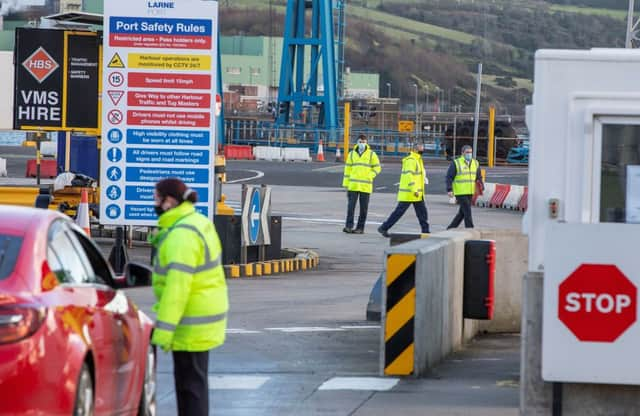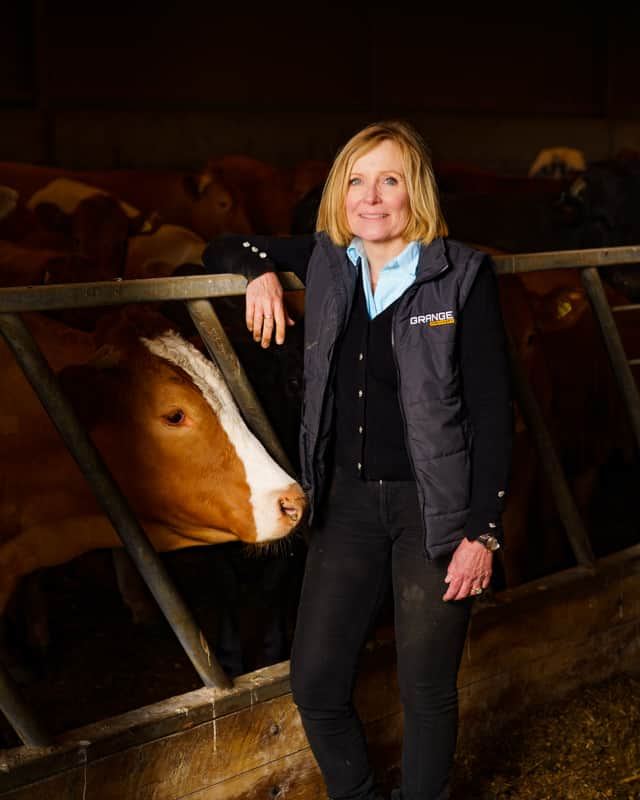Border target operating model: post-Brexit border checks on food products from EU delayed for fifth time
and live on Freeview channel 276
Post-Brexit border checks on food products coming from the EU have been delayed for a fifth time, the government has said.
The first stage of the UK’s new border model, originally set for October, is now delayed to January 2024, with physical checks and other requirements coming in throughout the next year.
Advertisement
Hide AdAdvertisement
Hide AdThe delay was confirmed as the Cabinet Office published its new border target operating model (TOM), which delineates the UK’s upcoming approach to safety and security controls on all imports, with a particular emphasis on sanitary and phytosanitary (SPS) measures for goods like live animals, plants, and animal products.
The Cabinet Office said: “Having listened to the views of industry, the government has agreed to a delay of three months for the introduction of remaining sanitary and phytosanitary controls, as well as full customs controls for non-qualifying Northern Ireland goods, which will now be introduced from January 2024.
“To give stakeholders additional time to prepare for the new checks, further controls have a revised timetable. These include checks on medium-risk animal products, plants, plant products and high-risk food (and feed) of non-animal origin from the EU, implemented in April 2024, and safety and security declarations for EU imports, implemented in October 2024.”


Goods from Britain have faced EU controls since it left the bloc’s single market at the start of 2021, but the UK has repeatedly put off checks in the other direction.
Advertisement
Hide AdAdvertisement
Hide AdCurrently, when UK businesses trade animal and plant products with the EU they get hit by post-Brexit red tape, while European firms are still able to export goods without full checks. Farmers have told NationalWorld that it means they're being undercut by their EU counterparts.
According to the revised timetable, starting from 31 January 2024, imports of medium-risk animal products, plants, plant products, and high-risk non-animal origin food (and feed) from the EU will require health certification.
By April 30, 2024, these items will undergo documentary, identity, and physical checks, while imports of sanitary and phytosanitary goods from other parts of the world will adopt a new risk-based approach.
From October 31 2024, safety and security declarations for EU imports will become mandatory, along with a more streamlined dataset for imports.
Advertisement
Hide AdAdvertisement
Hide AdThe Cabinet Office said that in developing the new regime, the government has been mindful of the potential impact on inflation, with an estimated impact on headline inflation expected to stand at less than 0.2% across three years.


“Throughout this we have been mindful of the impact of inflation, but I am not aware of any plans to move beyond the dates we have set out. We are introducing a sufficient time to enable businesses and those affected to plan,” the Prime Minister’s official spokesman said.
“That is what we have set out to them. It is worth being mindful that it is because of conversations with these businesses that we have brought in further time to plan so we have been listening to businesses throughout.”
Cabinet Office minister Baroness Neville-Rolfe said on the new border model: “Our border target operating model will ensure more efficient trading for businesses, protect against biosecurity threats and further crack down on illegal imports such as firearms and drugs. By making maximum use of data and new technologies, our innovative yet risk-based approach is key to delivering a world-class border system.
Advertisement
Hide AdAdvertisement
Hide Ad“Once fully implemented, these important post-Brexit measures will, I believe, bring considerable benefits to the UK economy and to UK trade, and the Government stands ready to support businesses through this transition.”
Meanwhile, Shadow International Trade Secretary Nick Thomas-Symonds said: “Leaving major changes until so close to the implementation deadline is unacceptable. It is yet another example of the challenges businesses face due to Conservative economic mismanagement.
“The Tories’ failed trade policy is stunting our economic growth. Labour will turn this around as part of our mission to secure the highest sustained growth in the G7.”
It comes after Labour wrote to the government last week, demanding answers about the "chaotic" border situation. Shadow minister Gareth Thomas wrote: "It beggars belief that this process has been handled in such a chaotic manner by government. Already hard-pressed businesses have been forced to waste time and money preparing for arrangements that may, yet again be delayed."
Advertisement
Hide AdAdvertisement
Hide Ad

Farmers have said they have been undercut by EU products, which do not face the same controls that they do when exporting.
Liz Webster, founder of Save British Farming, told NationalWorld: "The English farmer has been the biggest victim of Brexit. Within the UK internal market we've been disadvantaged, and with European farmers able to export here with no horrible red tape they’ve been able to undercut us. This is why we've seen pork and eggs collapse in particular.
"If they apply checks for EU imports, most EU exporters will give up exporting their much loved produce to the UK. Far from taking back control, we’re opening ourselves up to anybody buying low quality meat at the market."
The North Wiltshire beef farmer said she believes the food checks have been delayed due to concerns about the country's food security, which is currently around 60% according to the NFU. "They've delayed these food import checks because they're inflationary, but also because it will affect supply," she explained. "If they put the checks in, all of the EU exporters will have not bothered to send anything here."
Advertisement
Hide AdAdvertisement
Hide AdCucumber grower Tony Montalbano told NationalWorld that this year, in particular, he’s been undercut by cheaper imported vegetables from the Netherlands.
“When Europe has too much produce, their farmers flood the market in the UK because all our wholesalers have contracts with them. They sent it over because it is so cheap - it is cheaper to import it rather than paying us,” he said.
Tony said Brexit made it “really challenging” for businesses like his. “The first effect was the staff, I was really struggling to find people to pick the product,” he explained. “Then all of our costs started going up because of it, importing and exporting, everything went up. Essential things like fertiliser got more expensive, it started affecting our prices.”
The news comes after almost 60% of British export businesses said they see no positive effect from post-Brexit trade deals in a government survey. It's the latest in a series Brexit delays or climbdowns by the government.
Advertisement
Hide AdAdvertisement
Hide AdWilliam Bain, head of trade policy at the British Chambers of Commerce, said: “Businesses will be pleased with this clarity as they prepare for the challenging shift to a digital trade system. The focus must now be on delivering the Single Trade Window to the timescales set out. The new approach to digitalising borders for goods movements could bring real benefits to the SMEs we represent, to trade, and to the economy.
“The critical thing is preparedness. Businesses are making investment and supply chain decisions for the long term and need to be confident that the physical and digital infrastructure around the GB border is going to be in place on time.”
Comment Guidelines
National World encourages reader discussion on our stories. User feedback, insights and back-and-forth exchanges add a rich layer of context to reporting. Please review our Community Guidelines before commenting.
